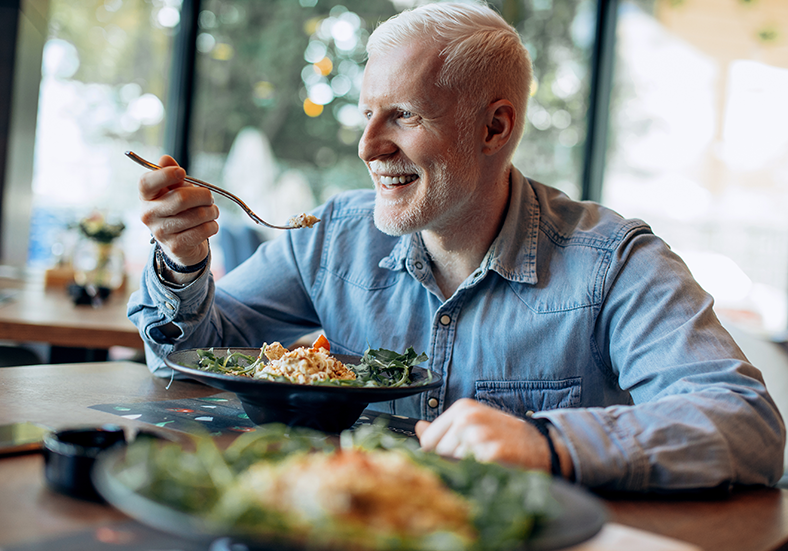We offer more consultations and counseling for all health and well-being needs.

What is intuitive eating?
Intuitive eating can help you improve your relationship with food. It is a way to liberate yourself from the guilt, shame and anxiety created by toxic diet culture. Our registered dietitians are certified to teach this science-backed method, which empowers you to recognize and trust your body so you can meet your true needs.
At various times throughout the year, our UK dietitians hold interactive sessions with email support to help you learn and practice intuitive eating.
Research suggests intuitive eaters:
- Report higher levels of well-being and life satisfaction
- Experience more body appreciation and acceptance
- Feel more pleasure from eating and enjoy a wider variety of foods
- Engage in less emotional eating and binge eating
- Have lower blood pressure and triglycerides, and higher HDL (good cholesterol)
Would I benefit from intuitive eating?
Do any of the statements below resonate with you? If so, then you are ready for intuitive eating.
- I want to feel calm and in control around food.
- I want to stop thinking about food all the time.
- I want to be able to trust my body when it tells me it’s hungry or full.
- I want to be able to trust myself around all foods.
- I want to learn how to cope with my feelings without relying on food.
- I want to exercise because I enjoy it, not just to “burn calories.”
- I want to be able to eat any food without guilt, shame or anxiety.
We'll help you learn to relax and enjoy eating.

EdD, RD
Karen Bryla McNees
"I can help you simplify the process of eating well and bridge the gap between knowing and doing. I believe eating well can be practical, flexible and accessible to anyone!"
1. Reject the diet mentality
Throw out the diet books and magazine articles that offer you the false hope of losing weight quickly, easily and permanently. Get angry at diet culture that promotes weight loss and the lies that have led you to feel as if you were a failure every time a new diet stopped working and you gained back all of the weight. If you allow even one small hope to linger that a new and better diet or food plan might be lurking around the corner, it will prevent you from being free to rediscover intuitive eating.
2. Honor your hunger
Keep your body biologically fed with adequate energy and carbohydrates. Otherwise you can trigger a primal drive to overeat. Once you reach the moment of excessive hunger, all intentions of moderate, conscious eating are fleeting and irrelevant. Learning to honor this first biological signal sets the stage for rebuilding trust in yourself and in food.
3. Make peace with food
Call a truce; stop the food fight! Give yourself unconditional permission to eat. If you tell yourself you can’t or shouldn’t have a particular food, it can lead to intense feelings of deprivation that build into uncontrollable cravings and often, bingeing. When you finally “give in” to your forbidden foods, eating will be experienced with such intensity it usually results in overeating and overwhelming guilt.
4. Challenge the food police
Scream a loud NO to thoughts in your head that declare you’re "good" for eating minimal calories or "bad" because you ate a piece of chocolate cake. The food police monitor the unreasonable rules diet culture has created. The police station is housed deep in your psyche, and its loudspeaker shouts negative barbs, hopeless phrases and guilt-provoking indictments. Chasing the food police away is a critical step in returning to intuitive eating.
5. Discover the satisfaction factor
The Japanese have the wisdom to keep pleasure as one of their goals of healthy living. In our compulsion to comply with diet culture, we often overlook one of the most basic gifts of existence—the pleasure and satisfaction that can be found in the eating experience. When you eat what you really want, in an environment that is inviting, the pleasure you derive will be a powerful force in helping you feel satisfied and content. By providing this experience for yourself, you will find that it takes just the right amount of food for you to decide you’ve had "enough."
6. Feel your fullness
In order to honor your fullness, you need to trust you will give yourself the foods you desire. Listen for the body signals that indicate you are no longer hungry. Observe the signs you’re comfortably full. Pause in the middle of eating and ask yourself how the food tastes, and what your current hunger level is.
7. Cope with your emotions with kindness
First, recognize that food restriction, both physically and mentally, can trigger loss of control that can feel like emotional eating. Find kind ways to comfort, nurture, distract and resolve your issues. Anxiety, loneliness, boredom and anger are emotions we all experience. Each has its own trigger and appeasement. Food won’t fix any of these feelings. It may bring comfort for the short term, distract from the pain or even numb you. But food won’t solve the problem. If anything, eating for an emotional hunger may only make you feel worse in the long run. You’ll ultimately have to deal with the source of the emotion.
8. Respect your body
Accept your genetic blueprint. Just as a person with a shoe size of eight would not expect to squeeze into a size six, it is equally futile (and uncomfortable) to have a similar expectation about body size. But mostly, respect your body so you can feel better about who you are. It’s hard to reject the diet mentality if you are unrealistic and overly critical of your body size or shape. All bodies deserve dignity.
9. Movement - feel the difference
Forget militant exercise. Just get active and feel the difference. Shift your focus to how it feels to move your body rather than the calorie-burning effect of exercise. If you focus on how you feel from working out, it can make the difference between rol
10. Honor your health
Make food choices that honor your health and taste buds while making you feel good. Remember, you don’t have to eat perfectly to be healthy. You will not suddenly get a nutrient deficiency or become unhealthy from one snack, one meal or one day of eating. It’s what you eat consistently over time that matters. Progress, not perfection, is what counts.
News
Podcasts
Health and Wellness
We offer this benefit to you and your spouse while you’re an employee and as a retiree. All retirees and most employees are eligible, but if you’re less than half-time please review the details.
Contact our office
Monday-Friday 8 a.m. to 4:30 p.m.
(859) 257-9355
healthandwellness@uky.edu
A-250 Southcreek Park, 2365 Harrodsburg Road


